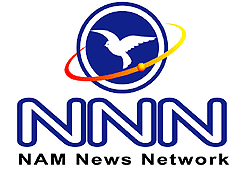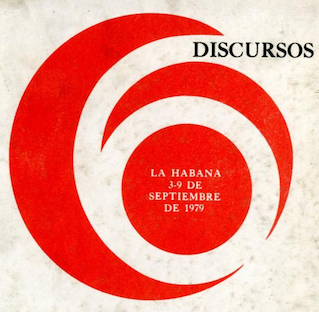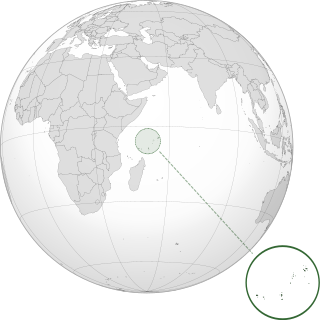The New World Information and Communication Order is a term coined in a debate over media representations of the developing world in UNESCO in the late 1970s early 1980s. The NWICO movement was part of a broader effort to formally tackle global economic inequality that was viewed as a legacy of imperialism upon the global south.
Tanjug (/'tʌnjʊg/) was a Serbian state news agency based in Belgrade, which officially ceased to exist in March 2021. Since then, the Belgrade-based private company Tanjug Tačno has acquired the rights to use the intellectual property and trademarks of the former agency.

The NAM News Network (NNN) is a news agency established by countries of the Non-Aligned Movement to disseminate news which are not prejudicial to the third-world countries. It is run by Bernama, the national news agency of Malaysia and funded by the Malaysian government.

The 16th Summit of the Non-Aligned Movement was held from 26 to 31 August 2012 in Tehran, Iran. The summit was attended by leaders of 120 countries, including 24 presidents, 3 kings, 8 prime ministers and 50 foreign ministers.

The Socialist Federal Republic of Yugoslavia was one of the founding members of the Non-Aligned Movement. Its capital, Belgrade, was the host of the First Summit of the Non-Aligned Movement in early September 1961. The city also hosted the Ninth Summit in September 1989.
Egypt was one of the founding members of the Non-Aligned Movement (NAM). The preparatory meeting for the First NAM Conference in Belgrade was held in Cairo between 5 and 12 June 1961. The first NAM conference was cosponsored between President of Egypt Gamal Abdel Nasser and President of Yugoslavia Josip Broz Tito who sent joint letter to other leaders during their bilateral meeting in Egypt. Cairo hosted the Second Conference in October 1964 attended by forty-seven countries while Egyptian Red Sea resort Sharm el-Sheikh hosted the Fifteenth Conference in 2009. At the time of the Sharm el-Sheikh Conference 118 countries participated in the activities of the movement with some other countries having the observer status. 55 heads of state attended the 2009 conference. Official Egyptian state institutions view the movement as the broadest and the most important framework for developing countries to coordinate their stances on issues on the agenda of the United Nations and to act together against unilateral policies.

Iran–Yugoslavia relations were historical foreign relations between Iran and now split-up Socialist Federal Republic of Yugoslavia.

Third Conference of the Non-Aligned Movement on 8–10 September 1970 in Lusaka, Zambia was the third conference of the Non-Aligned Movement. A preparatory meeting of Foreign Ministers drafted a number of resolutions which were considered by the Summit Conference. President of Zambia Kenneth Kaunda opened the conference by underlining non-alignment as "the natural choice at the time of increased hostility created by ideological conflicts in the bipolar world"

The Non-Aligned Movement (NAM) is a forum of 120 countries that are not formally aligned with or against any major power bloc. It was founded with the view to advancing interests of developing countries in the context of Cold War confrontation. After the United Nations, it is the largest grouping of states worldwide.
Second Summit Conference of Heads of State or Government of the Non-Aligned Movement on 5–10 October 1964 in Cairo, United Arab Republic (Egypt) was the second conference of the Non-Aligned Movement which followed the Belgrade Conference of 1961 and preceded the Lusaka Conference of 1970. The city of Cairo was selected as a host of the summit conference at the preparatory meeting held in Colombo, Ceylon, on March 23, 1964. At the beginning of the conference the chairmanship of the Movement was transferred from the President of Yugoslavia Josip Broz Tito to the President of Egypt Gamal Abdel Nasser.

The 9th Summit of the Non-Aligned Movement on 4–7 September 1989 in Belgrade, SR Serbia, SFR Yugoslavia was the conference of Heads of State or Government of the Non-Aligned Movement. Belgrade was the first city to host the Summit for the second time after it hosted the 1st Summit of the Non-Aligned Movement in 1961. Yugoslavia was unanimously selected as the host of the Summit at the 1988 Non-Aligned Foreign Ministers Conference in Nicosia, Cyprus. While the Federal Secretary of Foreign Affairs of Yugoslavia led by Budimir Lončar was excited, the Presidency of Yugoslavia, Yugoslav collective head of state, was skeptical about the prospects of hosting the event but ultimately supported it by Josip Vrhovec in fear that rejection may show the level of the crisis in the country. The comparatively weak federal government organizers of the event ultimately hoped that the conference may convince leaders of the strong Yugoslav federal republics to resolve the early Yugoslav crisis in a constructive and peaceful way, yet it nevertheless escalated in 1991 Yugoslav Wars. The event is therefore sometimes described as the swan song of the prominent Yugoslav Cold War diplomacy. Summit took place at the Sava Centar in New Belgrade. Janez Drnovšek held the opening remarks in Slovenian language.

60th Anniversary Additional Commemorative Non-Aligned Meeting is the 11–12 October 2021 Non-Aligned Movement commemorative meeting taking place in Belgrade, Serbia. The meeting was organized by the Ministry of Foreign Affairs of Serbia, and cohosted with Azerbaijan, in commemoration to the 1st Summit of the Non-Aligned Movement. President Ilham Aliyev made opening speech in a video format. Minister of Foreign Affairs of Serbia Nikola Selaković underlined that his county's strategic and essential goal is membership in the European Union, but that Serbia will not give up on its traditional friends which are not only Russia or China but all member states of the Non-Aligned Movement. While reflecting on historical achievements Indian representative Meenakshi Lekhi invited honest introspection if movement is to keep its relevance and called unnamed member states to avoid insistence on divisive issues and bilateral score-settling which make NAM increasingly ineffective. Participants vocally decried the disparity in vaccine access between developed and developing countries.

6th Summit of the Non-Aligned Movement took place on 3–9 September 1979 in Havana, the capital city of Cuba. 93 countries took part in the summit. It was the first NAM summit which took place in one Iberoamerican country. The event was marked by political and ideological divisions among the non-aligned countries. The organizer wanted to use the event to propose "a natural alliance" between the movement and the Eastern Bloc causing strong resistance from some members, particularly SFR Yugoslavia. While both Cuba and Yugoslavia were at the time nominally socialist states, they took substantially different position in world politics with Cuba perceiving United States and Yugoslavia perceiving Soviet Union as the main threat to its independence.

Iraq–Yugoslavia relations were historical foreign relations between Iraq and the former Yugoslavia. Iraq established diplomatic relations with the Socialist Federal Republic of Yugoslavia in 1958. Josip Broz Tito visited Iraq in August 1967 and again in February 1979.

Seychelles–Yugoslavia relations were the historical foreign relations between Seychelles and Yugoslavia. The two countries established formal relations in 1977, upon the independence of Seychelles from the United Kingdom. Both countries were members of the Non-Aligned Movement during the Cold War.

10th Summit of the Non-Aligned Movement on 1–6 September 1992 in Jakarta, Indonesia was the conference of Heads of State or Government of the Non-Aligned Movement. Around 100 delegations, including some 60 heads of State or government, participated in the Summit in Jakarta.

1978 Non-Aligned Foreign Ministers Conference was held in Belgrade, SR Serbia, SFR Yugoslavia, between 25 and 30 July 1978. The conference was organized as a preparatory event ahead of the divisive 6th Summit of the Non-Aligned Movement which took place in Havana next year. The NAM member states were deeply divided over Cuban military actions in Africa and country's pro-Soviet politics with some of them threatened to boycott the Summit in Havana. The host country of Yugoslavia was recognized as the leader of the middle ground delegations which wanted to overcome divisions and radicalism and was in this effort supported primarily by India, Sri Lanka and Indonesia.

Mediterranean island country of Cyprus was one of the founding members of the Non-Aligned Movement with Makarios III attending the 1st Summit of the Non-Aligned Movement in Belgrade, SFR Yugoslavia in 1961, just one year after the Cypriot independence. Membership in the movement was perceived as one of two major foreign-policy alternatives with the first one being formal membership in NATO at least nominally supported by both Greece and Turkey in the initial period after the London and Zürich Agreements and second one being pro-western participation in Non-Aligned Movement where United Kingdom and United States preferred this option at least until 1963.
1975 Non-Aligned Foreign Ministers Conference was held in Lima, Peru in between 25 and 30 August. Non-Aligned countries agreed to establish Solidarity Fund for Economic and Social Development as well as the Special Fund for Financing of Buffer Stocks of Raw Materials and Primary Products Exported by Developing Countries.

The 1985 Non-Aligned Foreign Ministers Conference was held in Luanda, capital of Angola from 4 to 7 September with the senior officials meeting being held on 2 and 3 September. The organization of the conference in the circumstances of the ongoing Angolan Civil War was described as a large scale organizational undertaking and a considerable achievement.














